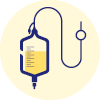- Home
- Bowel cancer
- Treatment for early bowel cancer
- Surgery
- What to expect after surgery
What to expect after surgery for bowel cancer
This is a general overview of what to expect. Your recovery time after the operation will depend on your age, whether you had open or keyhole surgery, whether you have a stoma, and your general health. You will probably be in hospital for 2–7 days, but it can take 2–3 months to fully recover.
Learn more about:
 Recovery time
Recovery time
- In hospital you will have to wear compression stockings to keep the blood flowing in your legs.
- You will also be given a daily injection of a blood thinner to reduce the risk of developing blood clots.
- Some people also wear special cuffs around the legs to keep the calf muscles moving.
- Some people may have to wear the compression stockings and have the injections for a couple of weeks after the surgery.
- You will need to avoid driving after the surgery until you can move freely without pain. Discuss this issue with your doctor. Check with your car insurer for any exclusions about major surgery and driving.
 Pain relief
Pain relief
- You will have some pain and discomfort for several days after surgery, but this can be controlled with pain medicines.
- Pain medicines may be given:
- by an injection near your spinal column (epidural or spinal anaesthetic)
- through a drip you can control with a button (patient-controlled analgesia or PCA)
- as pills or tablets
- through little tubes giving local anaesthetic near the wound (transversus abdominis plane or TAP block catheters)
- Let your doctor or nurse know if you are in pain so they can adjust the medicines to make you as comfortable as possible. Do not wait until the pain is severe.
- For more on this, see Pain and cancer.
 Drips and tubes
Drips and tubes
- You will be given fluids through a drip (also called an intravenous or IV infusion) until you can start drinking and eating. You may need a drip for a few days.
- You may also have other tubes – from your bladder to drain urine (catheter) or from your abdomen to drain fluid from around the surgical area.
- In most centres, you will be given water to drink a few hours after the surgery, and you will usually start on solid foods the day after the surgery (or even on the day of the surgery if you feel well). You may also be given nutritional supplements to drink.
 Activity and exercise
Activity and exercise
- Your treatment team will encourage you to walk the day after the surgery.
- Avoid heavy lifting (more than 3–4 kg) for about 4–6 weeks.
- A physiotherapist will teach you breathing or coughing exercises to help keep your lungs clear. This will reduce the risk of getting a chest infection.
- Gentle exercise has been shown to help people manage some of the common side effects of treatment and help them return to their usual activities faster.
- See an exercise physiologist or physiotherapist for advice.
- Your doctor may advise you to avoid sexual intercourse for a few weeks after surgery. Ask them when you can have penetrative sex again, and explore other ways you and your partner can be intimate, such as massage. For more on this, see Sexuality, intimacy and cancer.
Podcast: Managing Cancer Pain
Listen to more episodes from our podcast for people affected by cancer
→ READ MORE: Radiation therapy for bowel cancer
More resources
A/Prof David A Clark, Senior Colorectal Surgeon, Royal Brisbane and Women’s Hospital, QLD, The University of Queensland and The University of Sydney; Yvette Adams, Consumer; Dr Cameron Bell, Gastroenterologist, Royal North Shore Hospital, NSW; Katie Benton, Advanced Dietitian Cancer Care, Sunshine Coast University Hospital and Queensland Health, QLD; John Clements, Consumer; Dr Fiona Day, Medical Oncologist, Calvary Mater Newcastle, NSW; Alana Fitzgibbon, Clinical Nurse Consultant, GastroIntestinal Cancers, Cancer Services, Royal Hobart Hospital, TAS; Prof Alexander Heriot, Consultant Colorectal Surgeon, Director Cancer Surgery, Peter MacCallum Cancer Centre, and Director, Lower GI Tumour Stream, Victorian Comprehensive Cancer Centre, VIC; Caitriona Nienaber, 13 11 20 Consultant, Cancer Council WA; Dr Kirsten van Gysen, Radiation Oncologist, Nepean Cancer Care Centre, NSW.
View the Cancer Council NSW editorial policy.
View all publications or call 13 11 20 for free printed copies.

